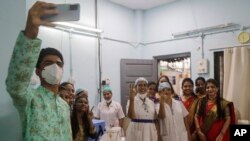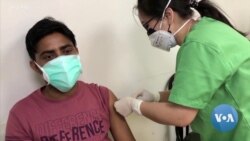India celebrated the milestone of administering one billion doses of COVID-19 vaccines on Thursday, marking a key turnaround in a drive that got off the ground slowly earlier this year.
India is the second country after China to reach the one billion mark in its immunization program.
“India scripts history. We are witnessing the triumph of Indian science, enterprise and collective spirit of [1.3 billion] Indians,” Prime Minister Narendra Modi said in a Twitter post Thursday. “Gratitude to our doctors, nurses and all those who worked to achieve this feat.” He visited a government hospital to mark the occasion.
However, with only about 30% of the population fully inoculated, India still needs to administer tens of millions of doses to those who have only received one dose.
Amid concerns over the wide gap that needs to be bridged between those fully and partly inoculated, officials say they aim to inoculate the adult population of 944 million by the year end.
Still, the billion doses mark significant progress in the country that has counted more than 34 million infections — the second highest in the world.
“I think it’s a morale booster,” said K. Srinath Reddy, president of the Public Health Foundation of India, a public-private partnership. “Because it sort of gives us the confidence that we can get on with a vaccination program without getting resistance from the people and a machinery that is reasonably efficient reaching out in different parts of India.”
There was a scramble for vaccines in India earlier this year when tens of thousands fell sick or died as it reeled under a deadly second wave fueled by the delta variant. The government was criticized for failing to ensure adequate supplies even though India is the world’s biggest vaccine distributor.
But authorities bolstered the inoculation program in recent months and vaccine supplies have surged as the government helped companies increase production lines.
Officials are urging those who are not vaccinated to come forward — some 70 million Indians have still not received a single shot.
However, experts say vaccine hesitancy has not emerged as a major stumbling block.
“There are people who feel they do not need the vaccine because they have immunity,” Reddy told VOA. “But there is no anti-vaccine phobia in terms of suspecting that this is going to be a very dangerous vaccine that is going to harm them.”
In cities, where an army of migrant workers have to work outside their homes, there was a rush for vaccines. Ajay Kumar Nayak, a building contractor in New Delhi, said he got vaccinated as soon as his turn came for his safety. “When there is no proper cure, it is better to increase your immunity.”
Jospina Kajur, a housemaid who lost her job during the pandemic, said she wanted to get the vaccine because no one would hire her otherwise. “People ask for proof that we [have been vaccinated], so I show them my vaccine certificate.”
In rural areas, community health workers spread the message about the importance of vaccines. For those who were reluctant, several state governments made it mandatory to show the first-shot vaccination certificate to access welfare programs such as food rations.
Despite poor health infrastructure in villages, India’s long experience in conducting mass immunization programs among children and women helped the drive. Drones and boats have been used to deliver vaccines to isolated areas and health workers have trudged up Himalayan slopes to inoculate people living in remote villages.
India also plans to celebrate the one billion dose milestone by illuminating national monuments and musical programs.
Much of the country has reopened as infections drop to their lowest level in seven months —it has been counting about 15,000 new infections daily in the past week.
But with the festive season approaching, officials are advising caution. “If the virus becomes different or mutates, it changes the dynamics, it changes everything,” V.K. Paul, the head of the country’s COVID-19 taskforce said at a briefing recently.
Many however hope that the immunity built up by an estimated 70% of the population — either with vaccines or due to contracting COVID-19 — will afford some protection.
India also faces the challenge of deploying vaccines for children under 18, who make up 40% of the population. Although one locally developed vaccine has been approved for those above the age of 12 years, it is not yet being administered.
The progress in India’s vaccination drive, experts say, is also important for developing countries across Asia and Africa as it raises hopes that the world’s biggest vaccine maker will emerge as a major global supplier in the coming months.
With domestic stockpiles improving, India has resumed exports — the first batches of vaccines were sent recently to Nepal, Bangladesh, Myanmar and Iran.
“We will decide on further supplies based on our production and demand,” foreign ministry spokesman Arindam Bagchi said last week.
But with Indian companies on track to increasing their capacity significantly, analysts predict exports are expected to rise in the coming months.






